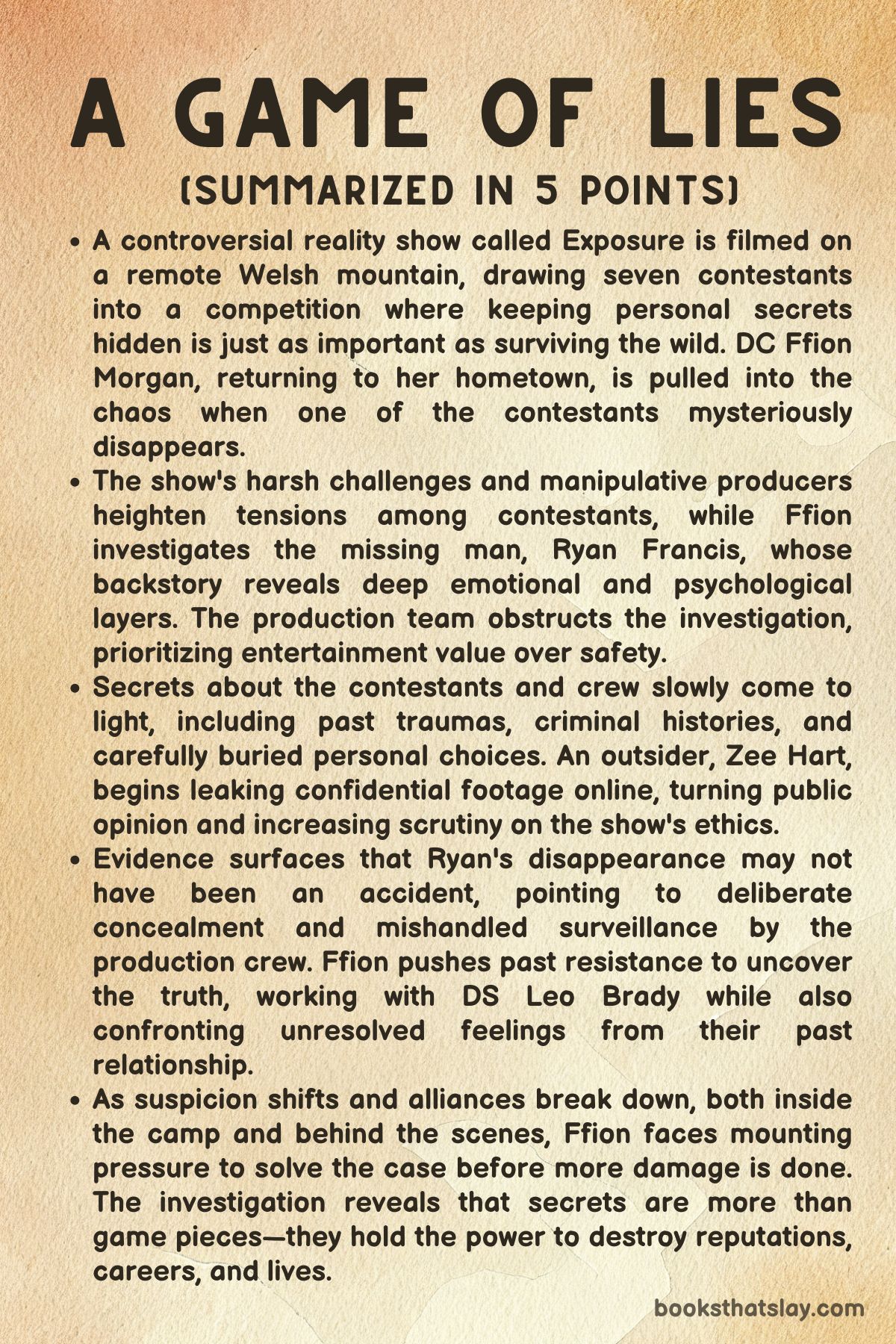A Game of Lies Summary, Characters and Themes
A Game of Lies is a psychological thriller by Clare Mackintosh that blends police procedural with the chilling world of reality television. Centered on DC Ffion Morgan, a sharp, irreverent Welsh detective, the story unravels the sinister events surrounding a controversial show called Exposure.
What begins as a surreal survival-style competition soon reveals a cruel psychological experiment—contestants are forced to keep damaging secrets while facing public humiliation and manipulation. When a participant goes missing and a producer is found dead, the story explodes into a multi-layered investigation filled with secrets, betrayal, and blurred lines between truth and performance.
Summary
DC Ffion Morgan, a sardonic, rule-breaking detective based in the rural Welsh village of Bryndare, is juggling her chaotic professional life and personal instability when she’s assigned to investigate a pile of bones found near the filming location of Exposure, a new reality television show. The show, held in a remote mountain camp in Cwm Coed, is marketed as a survival game but harbors a twisted objective: to expose each contestant’s darkest secret.
Viewers and contestants alike are invited to speculate, vote, and face consequences, transforming the format into an emotionally perilous spectacle. Ffion and her colleague Georgina visit the site and determine the bones are from a dog, but the strangeness of the camp—complete with psychological games, phobia-laced confession pods, and manipulative twists—sets off alarm bells.
As the first episode airs, the brutal mechanics of Exposure become apparent to Ffion and her family, including her sister’s boyfriend Caleb, a production runner who’s upset when his contribution goes uncredited. The cruel emotional manipulation becomes undeniable.
The next morning, chaos escalates: Ryan Francis, one of the contestants, has gone missing. Ffion and Georgina return to the camp, but the producers, particularly the slick Miles Young, are more focused on containing PR fallout than ensuring Ryan’s safety.
Surveillance reveals that Ryan escaped the fenced camp overnight. YouTuber Zee Hart, camped nearby to document and exploit the show’s drama for content, denies seeing him, though her intense involvement raises suspicions.
As the search continues, multiple perspectives—including DS Leo Brady from Cheshire CID, who has a complicated past with Ffion—join the narrative. Leo is drawn back into Ffion’s life through the case, and their reunion stirs unresolved tensions.
Meanwhile, a series of disturbing interactions within the camp begin to emerge. Dario Kimber, a failed contestant turned security guard, is manipulated by contestant Aliyah, who uses flirtation and secrecy to secure his cooperation.
Dario’s unhealthy obsession with being part of the show mirrors the voyeuristic, fame-hungry culture surrounding Exposure.
Ryan’s disappearance takes on new urgency as the investigation uncovers the psychological pressure he endured. His secret—his penchant for cross-dressing, known and accepted by his wife Jessica—was revealed in a way that deeply traumatized him.
Jessica accuses the producers of exploiting this information, especially since Ryan had a prior mental health episode noted in his application. The show’s failure to protect him becomes a central point of outrage.
When Ryan is eventually found—confused, armed with a knife, and emotionally shattered—he’s arrested but remains a suspect in the murder of Miles Young, who has been found strangled in his studio.
The murder investigation unfolds with suspicion cast on multiple contestants and staff. The evidence suggests Miles knew his killer, as there was no forced entry.
Surveillance and alibis gradually rule out several participants: Lucas and Henry were caught on camera; Pam was on a phone call; Jessica’s GPS confirms her location elsewhere. However, Ceri, a local postwoman and Ffion’s acquaintance, cannot account for her whereabouts and becomes a key suspect.
Forensics reveals glove-like imprints on the studio window, implying someone may have used socks to mask their fingerprints, further muddying the timeline.
As the investigators dig deeper, new motives emerge. Jason, whose secret of bigamy was revealed on the show, had attempted to deceive other contestants to protect his reputation.
When outplayed by Aliyah, he confronts Miles in fury. Aliyah, too, feels vulnerable after her secret—that she worked as an escort—comes to light.
She continues manipulating Dario, who becomes more erratic in his efforts to please her and hide his own late-night trespasses. Zee, the YouTuber, provides suspicious details, including spotting Ceri with a man in the woods and Dario sneaking into camp, further convoluting the case.
Tensions rise between Ffion and her ex Huw, who is now romantically involved with Ceri’s boss, Bronwen. As Ffion pushes him for information, she discovers that Ceri’s secret could implicate Bronwen, introducing another layer of motive.
Hoping to find clarity, Ffion and Huw open the contestants’ sealed box of secrets, hoping that one hidden truth might explain Miles’s death.
Ultimately, the shocking truth emerges. Henry, whose real identity is Clive Manning, is an undercover journalist embedded in the show.
Originally hired by Miles to dig up secrets, Henry was offered a side deal to act as a planted contestant with insider knowledge, ensuring drama and an engineered victory. But when Henry learns that Miles plans to betray him—evidenced by Henry’s own name being included in the box of secrets—he panics.
To protect himself, he murders Miles, uses editing software to falsify his alibi, and manipulates footage to hide his crime.
Henry believes his plan is airtight, but cracks appear. Ffion, removed from the case due to a conflict of interest, works outside official channels to investigate.
Her discovery of inconsistencies leads her to confront Henry’s setup. In a harrowing climax, Ffion becomes trapped inside a water-filled confession pod—another twisted feature of the show—intended to kill her.
She’s rescued at the last moment by Leo and Huw, thanks to her loyal dog Dave who leads them to the site.
The final chase ends with Henry’s arrest. DNA and physical evidence link him to Miles’s murder, and a new witness—a woman recognizing Henry from a past exploitative sting—confirms his predatory behavior.
In interrogation, Henry remains defiant, but the case against him is undeniable. The psychological damage left in his wake extends beyond murder: he represents the invasive, destructive power of manipulation masked as journalism and entertainment.
In the aftermath, Ffion takes responsibility for her lapses, including her emotional entanglements, and requests leave to reassess her life. She re-evaluates her relationship with Leo, who has also turned down a promotion to stay close to his son and maintain boundaries.
Ffion eventually shows up at Leo’s door, vulnerable for the first time, and tells him she loves him—a raw moment that suggests hope for healing.
A Game of Lies concludes not just with the mystery solved but with its characters irrevocably changed. Justice has been served, but the broader indictment of reality TV, media exploitation, and emotional manipulation lingers.
Beneath the layers of secrets and lies, it’s the honest, human moments that finally lead the survivors toward truth and connection.

Characters
DC Ffion Morgan
DC Ffion Morgan is the indomitable heart of A Game of Lies, a character whose contradictions make her all the more human. Her persona is a tightrope walk between sharp wit and emotional vulnerability.
A detective by profession, Ffion is unapologetically unorthodox, chafing against the stiff structure of bureaucracy while demonstrating an incisive mind for unearthing truths others miss. Her introduction, in a scene saturated with earthy realism and comic absurdity—especially involving her enormous, malodorous dog Dave—immediately establishes her as someone who lives on the margins of both the professional and the personal.
Her sharp tongue and prickly demeanor often alienate her from colleagues, like the cantankerous Alun and the passive-aggressive Georgina, but those same traits also mask deep emotional wounds and an unfulfilled yearning for meaningful connection, especially with Leo Brady. Ffion is an excellent detective precisely because she notices what others don’t—patterns of behavior, inconsistencies in testimony, human weaknesses.
Yet, that emotional acuity also burdens her, as she feels personally accountable for the suffering caused by institutional negligence and psychological cruelty. Her decision to pursue Henry alone, even when suspended, exemplifies her dogged sense of justice.
At the climax, her emotional declaration to Leo—finally uttering “I love you”—marks a seismic shift in her emotional arc, from detachment and avoidance to vulnerability and courage. Ffion is a portrait of resilience and complexity, torn between the personal chaos she carries and the moral clarity she seeks.
DS Leo Brady
DS Leo Brady is defined by his internal dichotomy—his need for stability and his vulnerability to emotional disruption. Leo’s life appears orderly on the surface: he’s a committed co-parent, dependable in his professional role, and cautiously dipping into the world of dating.
Yet, beneath that façade lies a man haunted by unresolved feelings for Ffion and shaken by the ethical ambiguities of his work. His reunion with Ffion reignites not just romantic longing but also professional admiration and moral urgency.
Leo’s role in the investigation is methodical and grounded, serving as a foil to Ffion’s impulsive brilliance. He remains cautious, sometimes even passive, but he evolves throughout the story, becoming more assertive and emotionally transparent.
His refusal to accept a promotion and his ambivalence about a transfer reflect an unspoken tether to both Ffion and the raw authenticity of the case. Leo is not flashy or dramatic, but his quiet integrity and emotional steadiness make him a moral compass in the storm of lies, manipulation, and exploitation.
When he ultimately accepts Ffion’s love—not immediately, but after reflection—he affirms a hope for redemption and stability born out of chaos.
Ryan Francis
Ryan Francis’s arc is the most psychologically harrowing in A Game of Lies, and perhaps the most tragic. A man tormented by internal conflict, Ryan enters the Exposure show hoping to reclaim his masculinity and self-worth, particularly in the eyes of his wife, Jessica.
His secret—his compulsion to wear women’s clothing—becomes the emotional epicenter of his shame, not because of what it is, but because of the societal and familial rejection he fears. His past, including a psychiatric hospitalization and violent reactions when exposed, reveals a man at war with himself.
The show’s cruel twist—to expose contestants’ deepest secrets on national television—triggers his unraveling. Ryan becomes the embodiment of what happens when personal truths are commodified for entertainment.
His escape, knife in hand, and final capture are not the actions of a criminal mastermind, but of a fractured man in psychological freefall. His arc culminates in a haunting reminder that vulnerability weaponized for ratings can have fatal consequences.
Despite being arrested, he is ultimately not the villain but a victim of systemic exploitation and emotional neglect.
Henry/Clive Manning
Henry, whose real name is Clive Manning, is the dark core of the narrative—the embodiment of moral corruption masked by professionalism. Initially introduced as a contestant, his true identity as an undercover investigative journalist and Miles Young’s secret weapon is slowly revealed.
Henry is a chameleon, able to manipulate people and footage with chilling precision. He murders Miles not out of passion or desperation but calculation, ensuring that his secrets remain buried while maintaining his cover with sociopathic calm.
His background—already marred by sexual coercion under the guise of journalism—solidifies his role not just as a murderer, but as a predator. Henry’s ability to blend in, to deceive not just the contestants but the audience itself, critiques the very foundation of entertainment media.
His attempt to drown Ffion in the confession pod adds a layer of horror to his profile, showing him as someone who doesn’t just kill to protect secrets but takes pleasure in control. His final capture doesn’t redeem him; rather, it unearths the magnitude of his deceit and leaves a lasting stain on the idea of journalistic neutrality.
Aliyah
Aliyah stands out as a character whose survival instincts and intelligence make her simultaneously admirable and morally ambiguous. Her secret—having worked as an escort—threatens her public image and future aspirations, forcing her into a strategic game of manipulation.
She recruits Dario, weaponizing his desire for proximity to power, and plays a double game within the group. Aliyah is always calculating, always adapting.
While others succumb to psychological pressure, she thrives in it, turning vulnerabilities into leverage. Yet, there’s an underlying sadness to her arc, a sense of someone forced to commodify her own narrative in order to maintain agency.
Her complexity lies in her refusal to be a victim—she doesn’t ask for sympathy, she demands space. In a story filled with secrets used as weapons, Aliyah owns hers like armor.
Zee Hart
Zee Hart represents the parasitic influence of social media and internet culture in A Game of Lies. A YouTuber camped near the Exposure set, she thrives on outrage, clicks, and sensationalism.
Her role in the story is not directly violent, but her impact is deeply corrosive. By manipulating footage, inserting false narratives, and prioritizing virality over truth, Zee amplifies public hysteria and distorts reality.
She is less a person and more a force—a mirror held up to our own complicity in consuming suffering for entertainment. Her intrusive presence and reckless commentary deepen the chaos and confuse the investigation, revealing that sometimes, the most dangerous lies are not told in whispers, but broadcast in high definition.
Dario Kimber
Dario Kimber is the pathetic, sleazy thread running through the show’s security apparatus. A man who once auditioned to be a contestant and was rejected, Dario accepts a position as a security guard, always lingering at the edge of fame, desperate to matter.
His interactions with Aliyah, in which he trades access for flirtation, are emblematic of his moral decay. Dario doesn’t have the cunning to be a true villain, but his weaknesses make him dangerous nonetheless.
His nighttime wanderings, his involvement in the damaged cameras, and his proximity to violence make him a walking liability. He is a man so desperate to be part of something larger than himself that he fails to recognize how thoroughly he’s been used—and how easily he becomes a suspect.
Miles Young
Miles Young is the Machiavellian architect behind Exposure, a producer who views human pain as a commodity. Miles’s manipulation of secrets, disregard for mental health disclosures, and ruthless drive for ratings make him a chilling character.
He recruits Henry under false pretenses, pushes contestants to their breaking points, and violates consent with shocking ease. His murder doesn’t spark sympathy, but it does signal a moral reckoning.
In a world where entertainment justifies cruelty, Miles represents the line that should never be crossed—but too often is.
Jessica Francis
Jessica Francis, Ryan’s wife, is a complicated figure whose disappointment and affection for her husband are constantly in tension. While she accepts Ryan’s cross-dressing, her subtle provocations and emotional distance contribute to his crisis of masculinity.
Jessica is not cruel, but her inability to fully engage with Ryan’s identity makes her a mirror of societal discomfort. Her outrage at the show for outing Ryan is sincere and justified, positioning her as a defender of dignity in a narrative defined by public shaming.
Ceri
Ceri, a local postwoman and acquaintance of Ffion, is a study in misdirection. At first, her anxious behavior and evasiveness paint her as suspicious, especially as she lacks a solid alibi during the murder timeline.
Her secret, closely tied to her employer Bronwen and indirectly to Ffion’s ex, Huw, becomes a focal point in the unraveling mystery. Ceri represents the many ordinary people caught in the crossfire of extraordinary deceit—those whose secrets are not monstrous, but who are forced to hide them because of institutional repercussions.
Her nervousness is not guilt, but fear of exposure in a world that offers no mercy for those caught with even minor flaws.
Themes
Surveillance, Privacy, and Exploitation
The structure of A Game of Lies is founded upon the ethics and dangers of surveillance, particularly as they manifest in entertainment and digital culture. The show Exposure is built around the revelation of personal secrets, weaponizing the contestants’ pasts and private identities for public consumption.
What begins as a competition quickly becomes an experiment in emotional and psychological dissection. Producers use confession pods rigged with phobia triggers and covert manipulation of footage to break contestants down, reducing them to spectacles rather than humans.
Ryan Francis’s exposure as a cross-dresser—something his wife accepted but he kept from the world—illustrates the devastating cost of such exposure. This private identity, taken from him without his consent, causes a psychological break, raising ethical questions about consent, autonomy, and the voyeuristic impulse of audiences and media creators alike.
The producers, particularly Miles Young, treat contestants as pawns in a game of ratings and spectacle, ignoring crucial information such as Ryan’s mental health history. This neglect transforms televised entertainment into a form of sanctioned cruelty.
Additionally, Zee Hart’s YouTube channel reveals a secondary layer of exploitation, as she films, edits, and distorts footage to increase engagement and manipulate public opinion, showcasing how surveillance is no longer confined to institutions but has become decentralized and commodified. In A Game of Lies, the line between reality and performance collapses entirely, turning every camera, every social post, and every confession into a tool of control.
The violation of privacy is not just a plot device—it is the entire framework through which modern cruelty is both normalized and monetized.
Psychological Trauma and Identity
The narrative intensely explores the psychological fragility that arises when identity is forcibly scrutinized or suppressed. Ryan’s internal conflict is not rooted in shame over who he is, but in the fear of societal rejection and personal inadequacy.
His choice to join Exposure is driven by a deep need to affirm his masculinity, believing that overcoming physical challenges will compensate for his concealed identity. Instead, the exposure of his secret exacerbates his emotional instability, triggering a descent into mental collapse.
The story treats trauma not as isolated pathology but as an accumulative erosion of safety, love, and agency. The manner in which Ryan is cornered—first by his internalized fears and then by the producers’ ruthless tactics—demonstrates how trauma becomes weaponized in the pursuit of content.
This theme is echoed across multiple characters. Aliyah, whose secret as a former escort threatens her future career, lives in constant fear of being reduced to a single, decontextualized truth.
Her alliance with Dario, an opportunistic and morally questionable figure, highlights how trauma can breed both desperation and complicity. Even Ffion and Leo carry the residual trauma of failed relationships and professional regret, navigating a world where emotional vulnerability is penalized.
In A Game of Lies, the psychological wounds of the characters aren’t just backstory—they are active forces influencing behavior, decisions, and relationships. Trauma becomes cyclical and contagious, especially when shame and exposure are incentivized by the systems around them.
Power, Control, and Manipulation
The novel offers a sharp critique of how power is exerted through manipulation, particularly in contexts where trust, secrecy, and vulnerability are currency. Miles Young, as the showrunner of Exposure, orchestrates every moment to maximize control over the contestants, using their fears and secrets to engineer emotional volatility.
He is not merely a passive observer of human conflict—he is an active provocateur, staging betrayals, controlling information, and even plotting with a fake contestant, Henry, to fabricate drama. His murder, while the catalyst for the crime investigation, is not treated as a tragic loss but rather as the inevitable consequence of unchecked manipulation.
Henry, posing as a journalist and faux-contestant, escalates the power dynamic to a lethal level. His covert mission to sabotage others while ensuring his own victory speaks to the most dangerous kind of manipulation: the one masked by moral legitimacy.
As an undercover journalist, Henry believes himself justified in deceiving others, even as he commits increasingly unethical and violent acts. His ability to manipulate audio, fabricate timelines, and hide evidence underscores the terrifying efficiency with which someone with knowledge and access can subvert justice.
In A Game of Lies, control is not just physical—it’s psychological, emotional, and technological. Everyone is playing a game, but only a few control the rules, and when the illusion of fairness collapses, so does the safety of all involved.
Moral Ambiguity and Justice
Justice in A Game of Lies is never straightforward. The investigative thread, led by Ffion and Leo, consistently reveals how the truth is distorted by incomplete information, personal bias, and the limitations of institutional power.
Ryan, though arrested for assault and suspected in Miles’s murder, is gradually revealed to be a man in mental crisis rather than a criminal mastermind. His breakdown forces the detectives—and the readers—to question how justice should treat individuals whose actions are driven by trauma rather than malice.
Similarly, Henry’s carefully curated public persona allows him to evade suspicion longer than most, despite being the actual murderer. He exploits the assumptions of others and the systemic blind spots within the investigation to maintain his facade.
Justice, when it finally arrives, is hard-won and incomplete. Ffion’s pursuit of the truth comes at the cost of her career stability and emotional well-being.
Her near-death experience in the flooded confession pod, set as a trap by Henry, is a stark metaphor for how easily justice can drown under the weight of manipulation. The police procedural element of the story reinforces that morality is often tangled in shades of gray.
Aliyah’s use of Dario, Zee’s exploitation of tragedy for views, and even Leo’s reluctance to confront his past with Ffion all speak to the uneasy balance between right and wrong. A Game of Lies resists tidy resolutions, instead suggesting that justice is fragile, complicated, and often deeply personal.
Intimacy, Regret, and Redemption
At the heart of the novel lies the evolving relationship between Ffion and Leo, whose history is marked by affection, miscommunication, and emotional withdrawal. Their reunion during the investigation reignites feelings neither has fully processed, forcing both characters to confront the choices they’ve made and the intimacy they’ve resisted.
Ffion’s emotional walls, reinforced by her chaotic life and disdain for authority, clash with Leo’s structured but emotionally repressed demeanor. Throughout the investigation, their interactions serve as moments of vulnerability in a narrative otherwise dominated by suspicion and manipulation.
The culmination of this arc—Ffion arriving at Leo’s door to confess her love—signals a turning point. This is not a romantic fantasy moment but a deeply human one: she is no longer hiding behind sarcasm or defensiveness, and he is no longer willing to retreat into detachment.
Redemption, for both of them, comes not through justice served in the murder case, but through emotional risk and honesty. Their relationship offers a counterpoint to the broader themes of manipulation and secrecy.
Where others lie to protect themselves, Ffion tells the truth to begin again. This redemptive ending doesn’t erase the pain or mistakes, but it asserts that personal growth and emotional connection are still possible even in a world built on deception.
In A Game of Lies, love and honesty are not escapes from the story—they are the only answers it has to offer.


